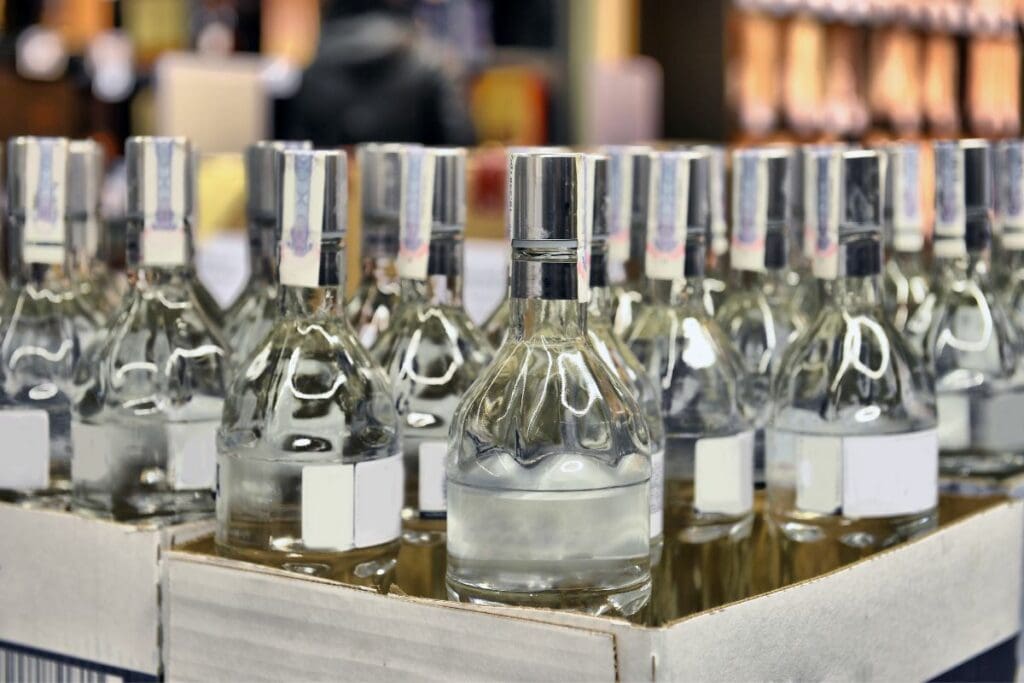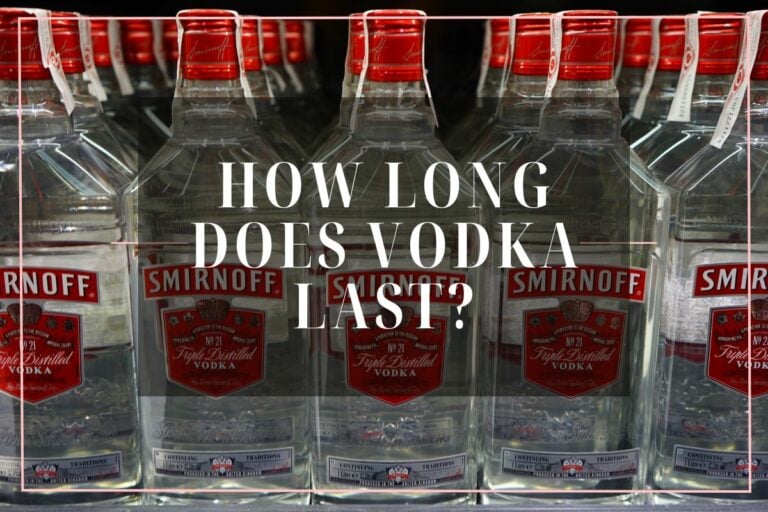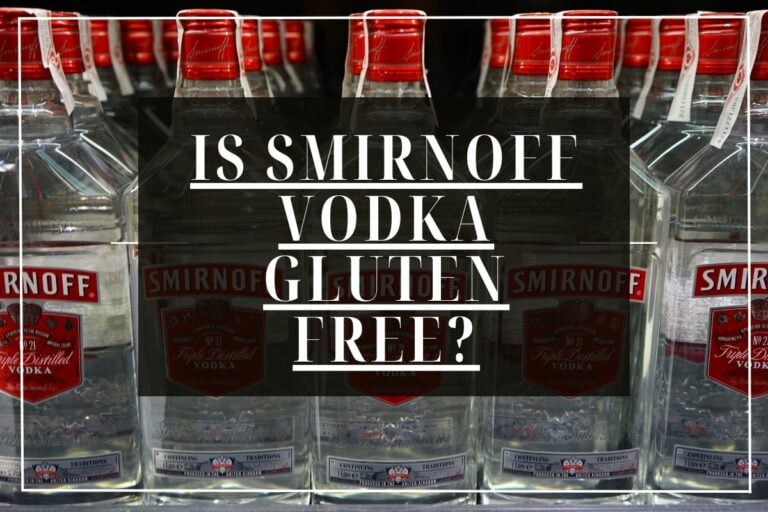Don’t Pour Another Glass Until You Read This! Can Vodka Really Go Bad?
Ever wondered if your bottle of vodka ever spoils or expires? The quick answer – hardly, thanks to its impressive 40% alcohol content. This blog post unravels the mystery surrounding vodka’s shelf life, offers tips for proper storage and unveils signs of a deteriorating bottle.
Continue reading to understand why that old Vodka bottle in your pantry is likely still good for a toast!
Does Vodka Go Bad or Expire?
Traditionally rich in alcohol content, vodka usually continues to maintain its drinkable quality even past a speculated “shelf life,” however, the color and flavor might change over time due to various factors.
Proper storage plays an essential role in preserving vodka’s characteristics; it should be kept in a cool, dark place to extend the shelf life. If there’s an off odor or flavor detected when you take a sip, or if the appearance seems strange, it would probably be best to discard your drink.
While unopened bottles may last indefinitely, once opened and not refrigerated properly, they pose more of a concern for potential spoilage.
Shelf Life of Vodka
Vodka boasts an impressive shelf life because of its high alcohol content. This distilled beverage, if stored correctly, remains drinkable indefinitely. You’ll notice that vodka doesn’t carry a specific expiration date like many other spirits or alcoholic beverages do.
That’s the beauty of this long-lasting and shelf-stable liquor, it can stand the test of time unlike wines or beers which have a definite lifespan. However, flavored variants such as fruit-infused vodkas might not enjoy as much longevity due to their additional ingredients which could shorten their shelf lives compared to their non-flavored counterparts.
Factors That Affect Shelf Life
Several factors play a significant role in the shelf life of vodka.
- Proper storage is crucial for maintaining both the quality and longevity of vodka, including unopened bottles and other distilled spirits.
- Exposure to light may lead to changes in the color or flavor of vodka.
- Extreme temperature conditions can also affect the alcoholic content of vodka, thereby reducing its shelf life.
- Once opened, a bottle of vodka can last between 10 to 20 years if it is stored under appropriate conditions.
- The addition of ingredients such as flavors or creams may shorten the life expectancy of certain types of vodka, including flavored alcohol and cream liqueurs.
- Lastly, handling and care during transportation also influence the shelf-stability of long-lasting alcohol beverages like vodka.

How to Store Vodka
Proper storage of vodka can significantly extend its shelf life, ensuring that your spirited beverage remains sharp and clear for your next cocktail party. Here’s a simple guide to keep in mind:
- Keep the vodka bottle sealed tightly.
- Store the vodka in a cool and dry location, away from direct sunlight.
- Avoid extreme temperature fluctuations.
- Store opened bottles upright.
- Use opened vodka within two years for best taste.
- Unopened vodka bottles can be stored indefinitely.
How to Tell if Vodka is Bad
Detecting spoiled vodka involves using a variety of your senses. Here are the key signs to look for:
- Keep an eye for visible impurities. If there’s particulate matter in your vodka, it might not be good for consumption.
- Observe the color of the vodka. Discoloration might indicate spoilage.
- The consistency should remain fluid. If the texture has become thick or syrupy, discard it.
- Check for a strong sour or musty smell coming out of the bottle instead of pure alcohol scent, this indicates that vodka is bad.
- A change in taste can also be a sign of spoiled vodka; if it tastes off, acidic or unusually sweet, don’t drink it.
Is Expired Vodka Safe to Consume?
Expired vodka generally remains safe to consume if it’s been correctly stored. Exposure to sunlight, extreme temperatures or contaminants might change its color, smell and taste though not necessarily making it hazardous.
However, flavor changes may result in a less appetizing drink but don’t pose a health risk. Unflavored vodka has an indefinite shelf life when unopened, only losing some flavor and alcohol content through slow oxidation after 40 to 50 years.
On the other hand, flavored vodkas tend to have shorter shelf life between six months and two years post-opening because they contain additional ingredients that could spoil over time.
Despite these alterations and potential loss of quality, you won’t find yourself running ill from drinking expired vodka as long as it hasn’t been contaminated with any harmful substances during storage.
Can Flavored Vodka Expire?
Flavored vodka showcases a shelf life that ranges from six months to two years. This shorter expiration timeline sets it apart from its plain vodka equivalent; the extra ingredients introduced in flavoring reduce the lifespan and increase susceptibility to quality deterioration.
An opened bottle of flavored vodka ideally receives thorough consumption within 90 days. Post this period, there’s a noticeable change as the taste loses its sharpness, indicating lowered consumable quality even though no specific expiration date exists for vodkas.
The consistency and aroma can also diminish over time despite optimal storage conditions that usually retain these features for up to two years following purchase.
Regular checks for alterations in texture, smell or appearance will ensure you’re not imbibing bad liquor since these transformations often reflect advanced product decline. Regardless of how much love one may have for individual flavors, understanding their temporal nature will undoubtedly enhance every sip’s enjoyment!
Does Vodka Go Bad in the Fridge?
Cold temperatures do not wreck vodka’s overall quality. Unflavored and opened bottles of vodka remain top-grade for two decades, even without refrigeration. Therefore, placing your vodka in the refrigerator won’t extend its shelf life.
However, flavored vodkas deviate from this norm due to added ingredients which can expire, impacting its taste and safety. A note of caution here – placing your flavored vodka or cream liqueurs with additional additives in the fridge is advisable to preserve their freshness, unlike regular unflavored varieties.
While many people opt for a chilled drink straight from the fridge, storing your bottle there remains optional rather than necessary when it comes to preserving longevity. The factor that truly matters most? An authentic seal on an unopened bottle ensures maintained quality over an extended time period whether stored in or out of the chilling cabinet.
Alternative Uses for Expired Vodka
Find out surprising and innovative ways to make use of expired vodka, from culinary tricks to household hacks. Discover how spoiled vodka isn’t wasteful after all; read on to learn more!
Creative ways to use expired vodka
Just because your vodka has passed its prime doesn’t mean it’s useless. There are many alternative uses for expired vodka that lend a second life to this enduring spirit.
- Tackle household cleaning duties with expired vodka. Its high alcohol content works wonders in removing grime and deodorizing surfaces.
- Eliminate stubborn stains from clothes or upholstery. A touch of vodka can aid in lifting those tricky spots.
- Make the most of the disinfecting power of outdated vodka, sanitizing household items and surfaces with a simple spray and wipe.
- Harness the scent – neutralizing properties of expired spirits to banish unpleasant odors from fabrics, shoes, or pet zones.
- Create homemade air fresheners or potpourri using spoiled vodka as a base – it’ll catch and carry your desired fragrances beautifully.
- With its adhesive-dissolving abilities, expired vodka is your go-to solution for removing stubborn stickers or sticky residue.
Non-consumable uses for spoiled vodka
Spoiled vodka finds alternative, non-consumable uses beyond the cocktail bar. Some of these practical applications may surprise you.
- Shine your silverware: Dampen a cloth with old vodka to bring back the shine of your tarnished silverware.
- Use as a glass cleaner: Expired vodka works wonders in cleaning glass and adding that extra sparkle.
- Repurpose for room freshener: Mix water, essential oil, and expired vodka to create your own DIY room spray.
- Kill weeds in gardening: Spoiled vodka acts as an effective weed killer when mixed with water and dish soap.
- Use it as a mosquito repellent: Apply expired vodka on skin or clothes to ward off bugs and mosquitoes.
- Craft homemade vanilla extract: Soaking vanilla beans in old vodka creates tasty homemade vanilla extract.
- Remove sticky labels: The high alcohol content helps remove residue from stickers and labels.
Conclusion
Vodka remains a reliable choice of spirits due to its impressive shelf life. Properly stored, it maintains its quality and potency for years extending far beyond conventional expiration dates.
However, factors such as exposure to heat or improper storage may affect its taste and quality over time. Therefore, mindful storing practices are quite essential when aiming for long-term preservation of vodka’s delightful essence.







